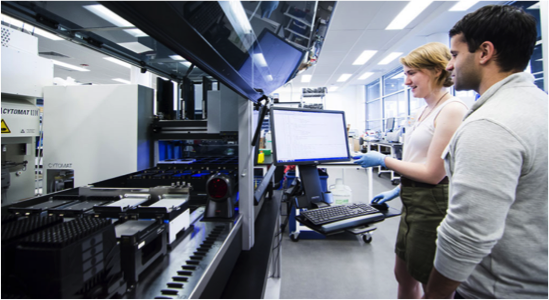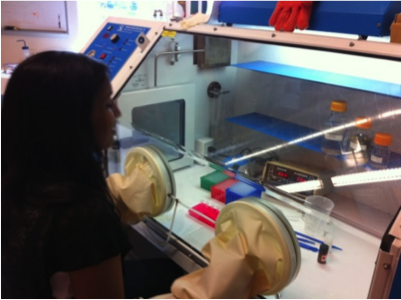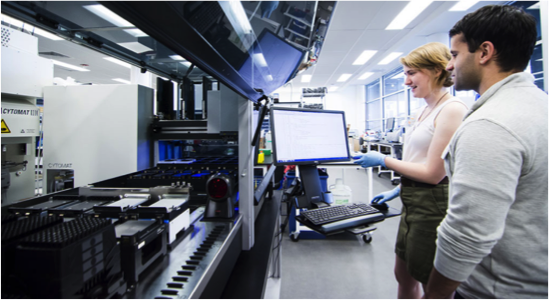
Turning Ideas Into Reality - Projects in Progress IV
ARPA-E focuses on next-generation energy innovation to create a sustainable energy future. The agency provides R&D support to businesses, universities, and national labs to develop technologies that could fundamentally change the way we access, use, and store energy. Since 2009, ARPA-E has provided approximately $2 billion in support to more than 800 energy technology projects.
In January, we introduced a new series to highlight the transformational technology our project teams are developing across the energy portfolio. The Ginkgo Bioworks and Evolva teams are working to turn biofuel ideas into reality.
Cars, trucks, and planes in the U.S. rely almost exclusively on petroleum-based fuels. Fossil fuels from petroleum are subject to price instabilities that impact consumers, as well as contribute to greenhouse gas (GHG) emissions. Biofuels are a promising alternative to petroleum. However, photosynthesis is an inefficient way to transfer energy from the sun to a plant and then to a biofuel, and the predominant biofuel produced in the U.S.--ethanol--is not suitable for high performance applications.
E. coli Engineered to Expedite Electrofuels
Ginkgo Bioworks worked to engineer E. coli to directly use carbon dioxide (CO2) to produce biofuels. Their process bypasses photosynthesis, usually a required step to convert solar energy into stored chemical energy in plants. Ginkgo Bioworks modified E. coli to metabolize CO2, in the form of formic acid, enhancing its rate of CO2 consumption and liquid fuel production.
Ginkgo Bioworks’ ARPA-E funded technology has the capability to capture greenhouse gas (GHG) compounds, like CO2 and methane, and convert them to higher-value chemicals and biofuels. The technology could reduce greenhouse gas emissions and, eventually, reduce the United States’ dependence on fossil fuels. The technology also creates a liquid transportation fuel that is cost competitive with traditional gasoline-based fuels and ten times more efficient than existing biofuels.
Ginkgo Bioworks has become a leading firm in biotechnology, continuing to expand its scope. Recently, the company started to harvest yeast and expand into cosmetics, agriculture, and pharmaceuticals. The company announced in October 2019 that it had raised $350 million in funds to invest in spinout ventures that use its bioengineering technology. Since 2014, Ginkgo Bioworks has received $428 million in private follow-on funding and has established four private partnerships. Additionally, Ginkgo Bioworks received nearly $3 million in funding from government agencies. The team has produced six subject inventions and applied for four patents, two of which have been granted.


10 years later: Ginkgo Bioworks anaerobic testing in 2010 (left), Ginkgo Bioworks in 2020 (right, Image obtained from Ginkgo Bioworks’ website)
Evolva’s Sesquiterpene Aviation Fuel: Built Plant Tough
OPEN 2012 team, Evolva, addressed the challenge of developing biofuels suitable for high-performance applications, such as aviation. The team produced terpenes--energy dense molecules that can be used as high-performance aviation fuels--from simple sugars using engineered microbes. These terpenes provided better performance than existing petroleum-based aviation fuels, and could be produced at low cost and large scale.
Evolva worked with Naval Air Weapons Station China Lake to evaluate the properties of its promising sesquiterpene molecules against jet fuel standards, testing in engines and unmanned aerial vehicles (UAVs). To reduce the GHG footprint of its renewable jet fuel, Evolva designed a process to utilize biomass feedstocks instead of corn grain.
In 2016, Evolva launched a collaboration with the U.S. Navy to develop a new class of structural composite materials developed from a polymer resin matrix derived from Evolva’s resveratrol. Resveratrol is an ingredient found in certain plants and is produced when the plant is exposed to extreme stress like heat, dehydration, or disease. Evolva developed and delivered the specified formulation of its advanced resveratrol, produced from natural and sustainable feedstocks, to the Navy. The composite materials produced can be used for both military and civilian applications. Specifically, the materials can be used for high-energy, high fire-risk applications such as fuel tanks, engine components, high-rise buildings, elevators, rockets, trains, and lithium battery casings.
The technologies developed by both Ginkgo Bioworks and Evolva have the potential to increase the production and use of domestic biofuels, which would reduce GHG emissions. Ginkgo Bioworks’ method to bypass photosynthesis could lead to a liquid fuel that is cost competitive with traditional gasoline-based fuels and more efficient than existing biofuels. Adoption of high performance fuel additives, such as Evolva’s, in the aviation industry could lead to increased flight range and lower cost for commercial air travel.
